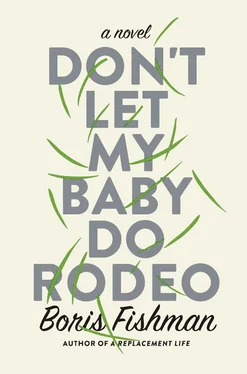“So why don’t we pick up and move to Paris, Maya,” Alex said. “What’s with you? Where do you want to go?”
“Nowhere,” she said after a silence. “So I guess we will put ‘closed’ on the form?”
“It is kind to the child if he doesn’t have to wonder who his birth parents were,” Alex said, imitating Tran Caldwell. “You know what’s kind to the child?” he said. “When he doesn’t have to wonder who his birth parents are — exactly. When he lives as a happy child of parents who love him and does his schoolwork and goes to see friends and plays soccer with his dad.”
“What if we get a six-year-old?”
“We’re getting a baby . We’re putting that down. I’m sorry — you made the big decision, you have to let me make some little decisions.”
“It’s true,” Maya said mournfully. “Who needs a child after that experience? It’s easier to get into the intelligence service. It could just be the four of us. Give your parents twenty years and they’ll be just like children. What more do we need?”
“Also, I like New Jersey,” he said.
“But we met in New York, Alex,” Maya said.
“New York is for young people.”
“We’re thirty-two, Alex. Thirty-three. It’s not old.”
“That woman has three children already,” he said. “You would like to bring up your child on New York prices? Should I commute from the city to my father’s office? And which hospital is awaiting your mammography skills in Manhattan? What’s gotten into you?”
What had gotten into her? Until now, she had imagined the arrival of a child in her life as an unconditional deliverance; the terror was of not persuading the agency people, and the full-bellied mothers, that she and Alex deserved to be parents. But what if the problems started only after the child arrived? Either because of the child, or how the child fit with her, or with Alex, or with the both of them, or a million other things. Light-headed, she had a macabre vision of putting up for adoption a child she’d just adopted. She felt crazy.
“Can I drive, Alex?” she said.
He looked at her helplessly. “What?” he said. “You don’t know how.”
“I need to learn,” she said.
“Right now?” he said, indicating the baked gray ribbon of highway before them, vehicles from a dozen tollbooth lanes slipstreaming into three. She saw herself reflected in his eyes: petulant, unsteady, impulsive.
“I need to learn,” she repeated, but now in a summing-up way, as a note to the future. She looked back at the road and imagined one of the other cars spinning into their flank, all the activity that would bring on, all the new issues that would now need decision, management, resolution. She and Alex wouldn’t be hurt, of course, though the comfort of that certainty made her imagine the opposite — she saw her legs folded at an unnatural angle. In returning to the present moment and its unexceptional safety, she was flooded with relief. Imagining horror always helped her that way.
In the three days remaining before the weekend visit to Bender, the psychologist, each member of the Rubin family arrived at his own accommodations with the new situation. Eugene, having seen Max in bed, asked no questions about whether his grandson continued to spend his nights there. Raisa, wishing to hold on to her victory, did the same; she labored in the kitchen, grateful to be left alone. Maya allowed herself to be reassured that Max did not require a pediatric behavioral specialist, that Bender would do it. In the afternoons, instead of driving home from the hospital, she drove to the curb of Terhune Elementary and waited for her son: This far she could drive, and would have even if she couldn’t. She had proposed to the other Rubins to ask the school to put Max on watch, but they had talked her out of it: Why did she want to mark their child as a misfit? The other children would find out. So the principal was told that Max had merely gone to a friend’s without calling. The principal heard Maya out with indulgence: He had been level-headed while she panicked.
Alex maintained routine — if no one else would stay calm, he would. Only now he didn’t know what to do with his afternoons — he noticed belatedly that he had become attached to his outdoor tent sessions with his son as a pleasurable burden: the men, alone, with the women and parents far away. Now forced to use his imagination to conjure an alternative, his mind rebelled — on principle, he did not like having to use his imagination; the need for it signified an inadequacy in the situation at hand, and he preferred to make peace with the inadequacy, to live without illusions. So he waited for his son to propose the alternative. His son did not, reverting to his afternoon duties at the side of his mother. Seeing them at the kitchen counter on his arrival from work, Alex went upstairs and turned on the television. Downstairs, they chopped and banged pots and stuffed napkins into crystal drinking glasses. Maya tried to consume her son’s attention with greater tasks than before: one afternoon, he was finally elevated to knife work. Her left hand closed his over a fleecy clump of parsley; her right steadied his as he held a small chef’s knife she had gone out to buy for his size. Obediently, Max’s hand moved under hers.
Alex appeared in the kitchen and stared at them — their son could not be entrusted to return from school alone, but she was teaching him to be more deft with a knife? She gazed back at Alex — what was the worry if Max’s behavior was normal, as he insisted? Alex shrugged and walked out to the living room. And yet, ultimately, their eyes separated without animosity; ultimately, their eyes said to each other: I don’t know, I don’t know, I don’t know. This kinship rubbed the edge from their disagreement: the kind of understanding spouses rely on and regret in equal degree.
As a whole, the Rubins, until now of the opinion that psychology was for quadriplegics and nut jobs alone, relented: Fine, let him go see Bender if Maya wanted it so badly. Their derision for Bender’s profession coexisted with a demand for its effectiveness; if their son and grandson had to succumb to the embarrassment, let him be healed rapidly, at the least. Any other outcome would confirm the other opinion, that it was all quackery. In this way, the Rubins forestalled the possibility of disappointment; each result would give them what they wanted.
Alex insisted on not telling Max about the impending visit to Bender lest he be needlessly frightened, but Max knew that some judgment awaited him; that is understood even by an eight-year-old. Eugene need not have refrained from asking about where his grandson was sleeping — Max continued to spend his nights in bed, though no one seemed to notice, save his mother, who seemed either unconcerned by the original behavior or unmollified by the fix. In fact, during one afternoon’s battered whitefish, Maya knelt down, took Max by the forearms, and said: “You know, you can sleep on the floor. You don’t have to sleep in the bed.” So it did make a difference to her. That night, he returned to the floor. As a kind of insurance in case his grandfather came to complain, Max discarded his pajamas and slept in briefs like a grown-up so his lungs would get bigger in the night.
Maya operated in glazed preoccupation; there was so often, on her face, a gathering of lines that parted only, and only sometimes, when she and Max took up cooking together, to which Max submitted every afternoon for that reason. Even at his age, he understood the cooking as a specialized task performed by a particular caste, but he was too young to understand whether the caste was lowly or high.
Over the whitefish, he had turned up to her and said: “Would you still cook if you didn’t have to feed us?”
Читать дальше












